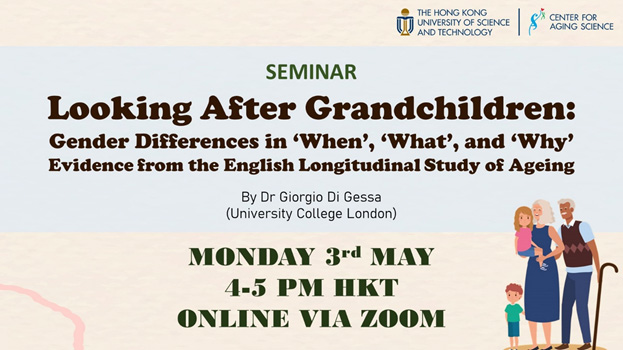Looking After Grandchildren: Gender Differences in ‘When’, ‘What’, and ‘Why’. Evidence from the English Longitudinal Study of Ageing
03 May 2021 (Mon)
4:00pm - 5:00pm
Online via Zoom
Dr Giorgio Di Gessa (University College London)
Abstract:
Grandparents play a vital role in providing childcare to families. However, little is known at the population level about when grandmothers and grandfathers look after grandchildren, what they do with them, and why. In this presentation, employing data from wave 8 (2016/2017) of the nationally-representative English Longitudinal Study of Ageing, I first describe the periodicity of grandchild care, activities undertaken with/for grandchildren, and motivations for such care to then assess if there are differences between grandmothers and grandfathers. Analyses were carried out on the entire sample of grandparents who provide childcare as well as on co-residing grandparent couples where both grandparents provide grandchild care. Overall, our study suggests few gender differences in the periodicity of grandchild care and reasons for looking after grandchildren, with almost two thirds of grandparents reporting that they wanted to help parents go to work and give them a break. However, when activities undertaken for/with grandchildren were analysed, clear gender differences emerged with grandmothers more likely to report caring and helping activities (e.g. cooking, caring when sick, helping with homework, and collecting them from school) than grandfathers, even when they coresided.
About the speaker:
Giorgio Di Gessa is a Research Fellow in Statistics & Epidemiology in the Department of Epidemiology and Public Health at UCL and a member of the English Longitudinal Study of Ageing (ELSA) research team. His academic interests include the demographic and social determinants of health and wellbeing in later life in Europe. Working on ESRC-funded projects, Giorgio has investigated the health impacts of paid work in mid and later life, and of grandparenting. He has published extensively using longitudinal secondary data (such as ELSA and SHARE) and his research applies advanced quantitative methodologies, including methods for dealing with missing data.
